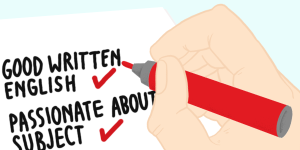(Note: I published this piece first in Research Fortnight on A-level results day, 2014…)
For many students, A-level results day is the culmination of a lengthy and complex university application process involving open days, UCAS forms, grade predictions, school references and admissions interviews. For some, the game will have started even earlier, with awards, experiences and sporting endeavours accumulated throughout adolescence on the promise that “this’ll look good on your personal statement.”
But Britain’s approach to undergraduate admissions is the exception, not the norm. Elsewhere in the world, systems tend to be more sensitive to uneven distributions of social capital, extra-curricular opportunities and guidance from friends, family and school. At a recent international conference, delegates from Northern European countries began to chuckle when I explained that applicants to British universities are given 4,000 characters to write freely about themselves. They felt sure such an indicator would reveal less about the applicant than their social and cultural background. Similar suspicions were raised in the 2004 Schwartz Report, which warned that “some staff and parents advise to the extent that the personal statement cannot be seen as the applicant’s own work.”
The alternative for many nations is appropriately contextualised attainment data. Rather than turn to non-academic criteria to choose between eligible applicants, universities in both Holland and Greece have experimented with lotteries to distribute places on oversubscribed programmes. Meet your course’s entry requirements and your name goes into a hat with every other applicant who reaches that threshold. No gaming the system with interview coaching, LAMDA examinations or extravagant work placements.
Even in the largely decentralised US admissions system, applicants must respond to ‘prompts’, including those below, that are designed to make the process fairer. Such prompts, rather than encourage applicants to cash in on past opportunities, call for focused, candid and reflective responses. College websites in the US reassure applicants that statements will be read “in their true context” (Princeton), and justify the use of non-academic indicators in terms of a “long history of encouraging diversity” (Brown).

My interest in the higher education admissions was sparked by Vikki Boliver’s 2012 finding that “applicants to Russell Group universities from state schools are less than two-thirds as likely to receive offers as privately educated applicants,” a differential that wasn’t attributable to ‘facilitating’ subjects. Last month, a study of 50,000 students by the University of Bristol confirmed similar concerns in relation to ethnic minority applicants. For example, for every 100 candidates of Pakistani ethnicity, seven fewer offers were made than for 100 equivalent white British candidates, a pattern that “could not be fully explained by differences in academic attainment or patterns of application.”
Last year, I published Sutton Trust funded research demonstrating that equal-attainment students submitted very different personal statements. Basic linguistic errors (such as spelling errors and apostrophe misuse) were almost three times more common in statements submitted by applicants attending sixth form colleges than by those attending independent schools. For some candidates, work experience meant school-facilitated day trips and paid Saturday jobs; for others, it involved shadowing public figures and undertaking high-prestige placements. My findings resonated with a 2010 survey by the Education and Employers Taskforce showing that 42% of young people from independent schools felt their work experience helped them get into university, as opposed to only 25% of those from comprehensive schools.
Of course, it’s possible that admission tutors see through advantages of school type to the candidate beneath. “Does the Sutton Trust really think I’m taken in by slick expensive personal statements?” tweeted Prof Mary Beard when my report first appeared. But last year The Times reported that statements were now regarded as “worthless” by many tutors, and the recent Pearson Think Tank report, (Un)Informed Choices, concluded that “the use of personal statements should be ended.” Unless all students’ applications are judged by staff with the experience and skill to separate privilege from potential, it’s difficult to excuse the continued use of an indicator that, according to a 1996 paper by Karen Surman Paley, affords hopefuls “just enough rope for a hanging.”
Whether this year’s A-level results bring good news or bad for individual students, questions remain about whether the half a million or so personal statements written every year represent an efficient use of time, energy and resource, either for schools and colleges or for the higher education sector. A growing body of evidence suggests that non-academic indicators, rather than bringing equality to the selection process, further advantage those applicants already favoured by school type and socio-economic background.


